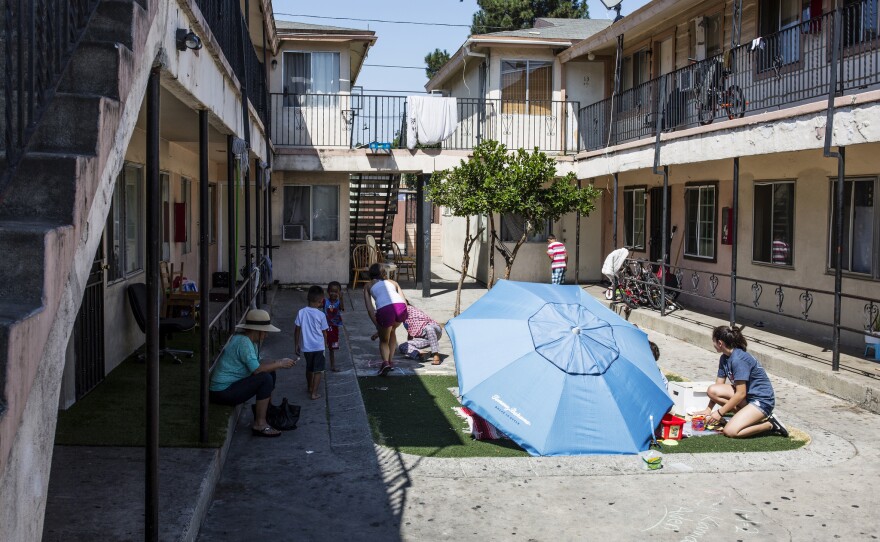Federal monitors raised concerns about a local refugee resettlement agency’s housing placement practices months before the organization’s employees committed additional violations, which KPBS uncovered and detailed in a series of reports last year.
The KPBS investigation found employees at the nonprofit International Rescue Committee in San Diego placed several large refugee families in homes that were too small based on occupancy guidelines. Landlords asked at least four families to move out due to overcrowding.
A June 2016 visit by officials with the U.S. State Department, which oversees the resettlement system, found the San Diego nonprofit complied with federal program rules.
However, the State Department asked the agency to address a handful of housing placement issues — including resettling refugees in homes too small to accommodate them. KPBS’s investigation showed that even after that request the improper practice continued.
KPBS’s reports and the State Department’s review highlight challenges resettlement workers face in finding affordable homes in high-cost areas, including San Diego.
The federal officials reviewed 19 case files during their visit at IRC San Diego and found in at least two instances homes did not appear to provide enough sleeping space for all of the refugees living in them. Two other files did not contain documentation proving the refugees were placed in adequate apartments and that they received required furniture and household items.
“Case files show that federal or local housing occupancy standards are not always applied,” the monitors said in a report about their visit.
The State Department recommended the agency ensure refugee families are placed in housing units that can accommodate their size.
In response, the International Rescue Committee said it was expanding its search area for affordable housing in the San Diego region, counseling families not to accept poor quality homes and reviewing procedures with staff.
KPBS found at least seven refugee families later that year were placed in housing situations that violated occupancy guidelines.
After the series of reports by KPBS, the IRC’s executive director stepped down, and the agency’s interim leader said the nonprofit was addressing the issue by expanding its housing search area, retraining staff and not accepting large families in San Diego unless they had ties to the region.
Mireille Cronin Mather, the IRC’s acting executive director in San Diego, has said out of roughly 2,200 refugees it has resettled over the past couple of years, 24 families were affected by the practice of placing families in homes too small to accommodate them.
Cronin Mather declined to be interviewed about the State Department’s 2016 findings. In an emailed statement, she said affordable housing in San Diego is an ongoing challenge and that the agency adequately responded to the report.
“As you may note, in 2016, we received (a) compliant rating on the monitoring report. But as with all findings from monitoring reports, we responded and acted upon those recommendations as appropriate,” said Cronin Mather, who is based in San Diego but has returned to her position as IRC’s regional director of U.S. programs.

Her statement also said that following KPBS’s initial report, IRC’s headquarters in New York hired a housing coordinator “to assist the greater network in housing challenges,” and the agency now requires employees include a copy of refugees’ leases in their case files.
“There is no program requirement that we have a lease on file, IRC took an extra step and we now require that everyone has a lease in a case file,” the statement said.
An IRC headquarters spokesman confirmed the change was made at all of the IRC’s affiliates, not just in San Diego.
Federal monitors in June 2016 also identified housing placement issues at two other San Diego resettlement agencies.
A review of Catholic Charities Diocese of San Diego said the agency was “mostly compliant” but noted that housing “was overcrowded, not always affordable and does not consistently contain all required furnishings and supplies.”
In response, the agency said it hired a housing specialist and required employees to document the condition of homes with photos.
Robert Moser, executive director of the local Catholic Charities, said resettlement during that period was difficult because of San Diego’s housing market and large bump in refugees compared to previous years. Former President Barack Obama had raised the cap on refugees by 15,000 and was planning for another boost the following year.
“Competition for apartments, the availability of residences, the size and composition of the families who were arriving all put challenges for our agency and the other agencies, but I think that’s where you can get lessons learned,” Moser said in an interview with KPBS.
He said he hopes one of those lessons includes better pacing of refugee arrivals.
“Hopefully, in the context of the future, we can balance between the flood of 2016 and the drought of 2017 and now in 2018 and have a flow that’s reasonable, manageable, affordable and where we can be the best that we can be,” Moser said. He was referencing the significant drop in arrivals under President Donald Trump’s immigration policies.
At the Alliance for African Assistance, monitors found at least one refugee living by choice in an overcrowded apartment. The officials noted that Alliance workers had counseled the refugee on the need to move to a less crowded home.






